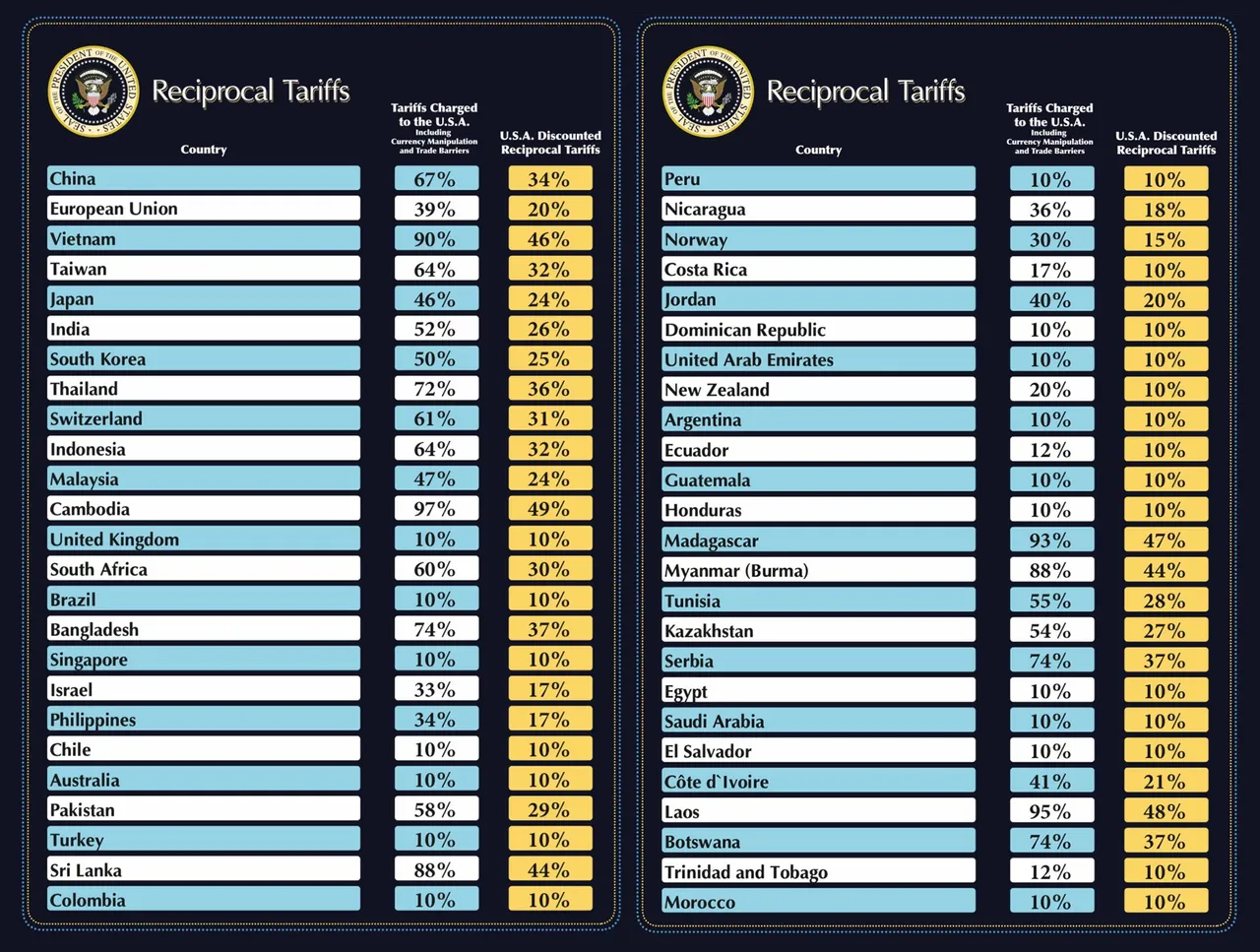Trump hat jetzt Zölle gegen die ganze Welt verhängt und behauptet es wären wechselseitige Zölle, da die meisten Länder die USA so unfair behandeln würden. Ist das wahr?
So wie immer ist es nicht ganz schwarz/weiß, sondern in manchem Punkten hat Trump durchaus recht, aber wenn man sich die Tabelle anschaut, die das Weiße Haus veröffentlicht hat, kommt es mir so vor, als würde Trump aus einer Mücke einen Elefanten machen.
Trump behauptet, die EU hätte den USA einen 39% Zoll auferlegt. Inkl. Währungsmanipulationen und Handelsbarrieren.
Eine ältere Studie von 2019 vom ersten Handelskrieg mit den USA gibt den (ungewichteten) Zoll, den die EU einhebt mit circa 5% an, jenen der USA mit nur 3.5%.
Das wäre ein Punkt für Trump, aber die Unterschiede sind in Wirklichkeit minimal. Möglich, dass die EU die USA in manchen Bereichen übervorteilt, aber umgekehrt ist das in anderen Bereichen auch möglich.
Die USA haben auch den Leitwährungsvorteil. Sie können damit in einem größeren Ausmaß Geld drucken als andere Länder und damit ausländische Waren importieren, noch bevor diese durch die Inflation teurer werden.
Vielleicht rechnet die USA auch die Einfuhr-Umsatzsteuer bei ihrer Berechnung hinzu oder, dass der Eurokurs im Verhältnis zum US-Dollar so schwach ist.
Ein weiteres Motiv für die Einfuhr der Zölle ist, eine neue Einnahmequelle für den Staat zu schaffen. Die USA hat nämlich keine bundesweite Umsatzsteuer, sondern die Sales-Tax wird von den Bundesstaaten und Gemeinden (Counties) eingehoben, manche haben sogar gar keine Sales-Tax bzw. eine viel geringere als die EU. In den USA ist die kombinierte Sales-Tax oft unter 10%, wovon wir in Europa nur träumen können.
Dass die Zölle die Einkommenssteuer ersetzen können, ist eher unrealistisch. Dazu müssten die Zölle noch deutlich höher ausfallen (>100%).
Allerdings würde es mit höheren Zöllen auch zu immer kreativeren Umgehungsgeschäften kommen. Waren würden über jene Länder importiert werden, wo die Zölle niedrig sind etc.
In Summe schaden Zölle dem internationalen Handel und verteuern die Produkte im Inland.
Mittlerweile weiß man auch, dass Trump Zölle vor allem auch als politische Waffe einsetzt, um andere Länder unter Druck zu setzen.
Das kann aber schnell nach hinten losgehen, die USA könnte sich damit zunehmend isolieren und nicht mehr als verlässlicher Partner wahrgenommen werden.
Was sagt ihr zum Zoll-Krieg der USA? Gerechtfertigt oder wirtschaftlicher Amoklauf?
New US tariff system against the entire world

https://x.com/WhiteHouse/status/1907533090559324204
https://x.com/atrupar/status/1907530974725902826
https://x.com/charliekirk11/status/1907532607778336910
The Effects of Tariffs: How the Machine Works
https://x.com/RayDalio/status/1907489922359132627
2019 (first trade war): When and how were the current US and EU tariffs on cars decided?
English
Trump now imposed tariffs against the entire world, claiming they are reciprocal tariffs because most countries treat the US so unfairly. Is that true?
As always, it's not entirely black and white, Trump is right on some points, but when you look at the table the White House has published, it seems to me that Trump is making a mountain out of a molehill.
Trump claims that the EU has imposed a 39% tariff on the US. Including currency manipulation and trade barriers.
An older study from 2019 on the first trade war with the US puts the (unweighted) tariff imposed by the EU at around 5% and that of the US at just 3.5%.
That would be a point for Trump, but the differences are actually minimal. It is possible that the EU is taking advantage of the US in some areas, but the reverse could also be possible in other areas.
The US also has the reserve currency advantage of the US Dollar. It can use this to print money to a greater extent than other nations and thus import foreign goods before they become more expensive due to inflation.
Maybe he US also includes the higher sales tax in the EU in its calculation or the fact that the euro exchange rate is so weak in relation to the US dollar.
Another motive for imposing tariffs is to create a new source of revenue for the state. The US does not have a federal sales tax, but the sales tax is levied by the states and counties, and some states even have no sales tax at all or a much lower one than the EU. In the US, the combined sales tax is often less than 10%, something we can only dream of in Europe.
It is rather unrealistic that customs duties can replace income tax. Tariffs would have to be significantly higher (>100%).
However, higher tariffs would also lead to increasingly creative circumvention schemes. Goods would be imported via countries where tariffs are low, etc.
All in all, tariffs harm international trade and make products more expensive domestically.
It is now also known that Trump uses tariffs primarily as a political weapon to put other countries under pressure.
However, this could quickly backfire and the US could become increasingly isolated and no longer be perceived as a reliable partner and ally.
What do you think of the US tariff war? Justified or economic rampage?